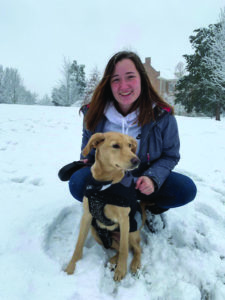Pets are becoming part of Maryville’s community

When campus reopened after winter break, students weren’t the only ones coming back—some brought their dogs with them! The Maryville College service animal policy “recognizes the importance of service animals and emotional support/ therapy animals” and goes further to define a service animal as “a dog that has been individually trained to do work or perform tasks for the benefit of an individual with a disability.”
Bill Tate, a commuting junior art major at Maryville College, brings along his 10-year-old mini schnauzer, Molly, to class every day. The Americans with Disabilities Act gives Molly, as a certified service dog, access to anywhere Tate goes, which includes the dining hall and all classrooms. Tate always packs a bag for Molly with snacks, blankets, and supplies in case she needs to be cleaned up after.
“She always comes first,” Tate said. He has been bringing Molly to classes for a year now and hasn’t had any problems with animal allergies or distractions. As an artist interested in large installation pieces, Tate often spends time in the workshop cutting materials such as wood. “The only small problem Molly’s had on campus is being leery of the chop saws,” Tate said, laughing.
After a year of being a service dog and attending classes, tagging along to the dining hall, visiting college events, and even playing in the campus woods, Molly has become an integrated part of the campus community.
“Everyone knows Molly by name,” Tate said. “Sometimes they come and say hello to her before they say hi to me!”

Tiara Kemp, a freshman nursing student living in Davis, has a different kind of support animal. Her dog Archie, a 7 month old retriever, labrador, and hound mix, is considered an emotional support animal.
This means that he’s not automatically allowed into classrooms, the dining hall, or any other public place on campus; an emotional support animal is only allowed to stay in the owner’s dorm room and must be kept on a leash at all times when walking around campus.
Kemp described her experience of being a pet owner on top of a student as hard but worth the stability and stress-relief that Archie as an emotional support animal gives her.
Because Archie is required to stay in her room while she’s in class, Kemp has to dedicate extra time to taking Archie to dog parks or the woods to play. She is also responsible for any of her dog’s medical bills and training expenses.
“It’s challenging to have a pet on campus,” Kemp said. “You really have to prioritize your dog to be successful.”
Although these two different kinds of support animals have different privileges on campus, the process of having an animal approved by the school is similar. Service dogs and emotional support animals alike must be approved through Kim Ochsenbein, the director of academic and disability services.
According to the requirements outlined by Maryville’s disability services, students requesting a service animal must provide documentation of a medical provider’s confirmation that “the animal has been prescribed for treatment purposes and is necessary to help alleviate symptoms associated with the person’s condition.”
If living on campus, students must also sign a contract with residence life and obey the guidelines of dorm living, such as letting the animal stay only in the owner’s room. Maryville College is accommodating of students’ needs and will work personally with students on a case by case basis when it comes to approving pets on campus.
It is important to note that support animals are intended to aid students for specific needs in their everyday lives and are on campus to fulfill that purpose; Tate and Kemp both commented that they hope other students will be respectful towards their service pets, as they are “on the job.” If you see Archie, Molly, or other service animals around, feel free to stop and get to know some of the new members of our campus community!
